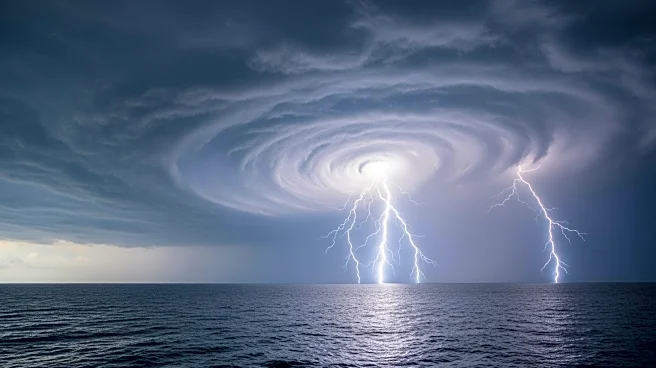What's Happening?
Hurricane Melissa is forecasted to intensify into a rare Category 5 storm as it approaches Jamaica, posing significant threats of life-threatening flash flooding and landslides. The cyclone, currently with winds reaching up to 120 mph, is expected to make
landfall by Tuesday, according to the US National Hurricane Center. As it moves northwest in the Caribbean, Melissa is anticipated to pass over Cuba by Wednesday before continuing through the Antillas Mayores and into the Atlantic. The storm is the 13th hurricane of the current Atlantic season, which typically concludes in November. Residents in affected areas, including parts of Haiti, the Dominican Republic, and eastern Cuba, have been advised to seek shelter and prepare for potential power outages and infrastructure damage.
Why It's Important?
The intensification of Hurricane Melissa into a Category 5 storm underscores the increasing severity of weather phenomena, which scientists attribute to climate change. The potential impact on Jamaica and surrounding regions is significant, with warnings of up to 30 inches of rain and sea level surges as high as 13 feet. Such extreme weather events can lead to catastrophic damage, affecting infrastructure, displacing populations, and straining emergency response systems. The economic and social implications are profound, as recovery efforts could require substantial resources and time. The situation highlights the urgent need for preparedness and resilience in the face of escalating climate-related threats.
What's Next?
As Hurricane Melissa approaches, residents in Jamaica and other affected areas are urged to complete preparations, including securing homes and stocking up on essentials. The Jamaican government, led by Prime Minister Andrew Holness, is emphasizing the importance of readiness to mitigate anxiety and potential harm. The storm is expected to weaken to a Category 3 by the time it reaches Cuba, but the overall impact remains severe. Continued monitoring and updates from meteorological agencies will be crucial in guiding response efforts and ensuring public safety.
Beyond the Headlines
The development of Hurricane Melissa highlights broader environmental and policy challenges related to climate change. The increasing frequency and intensity of such storms call for enhanced international cooperation on climate action and disaster preparedness. Additionally, the event may prompt discussions on infrastructure resilience and the need for sustainable development practices in vulnerable regions. The long-term implications of climate change on weather patterns necessitate a reevaluation of current strategies to protect communities and ecosystems.

















